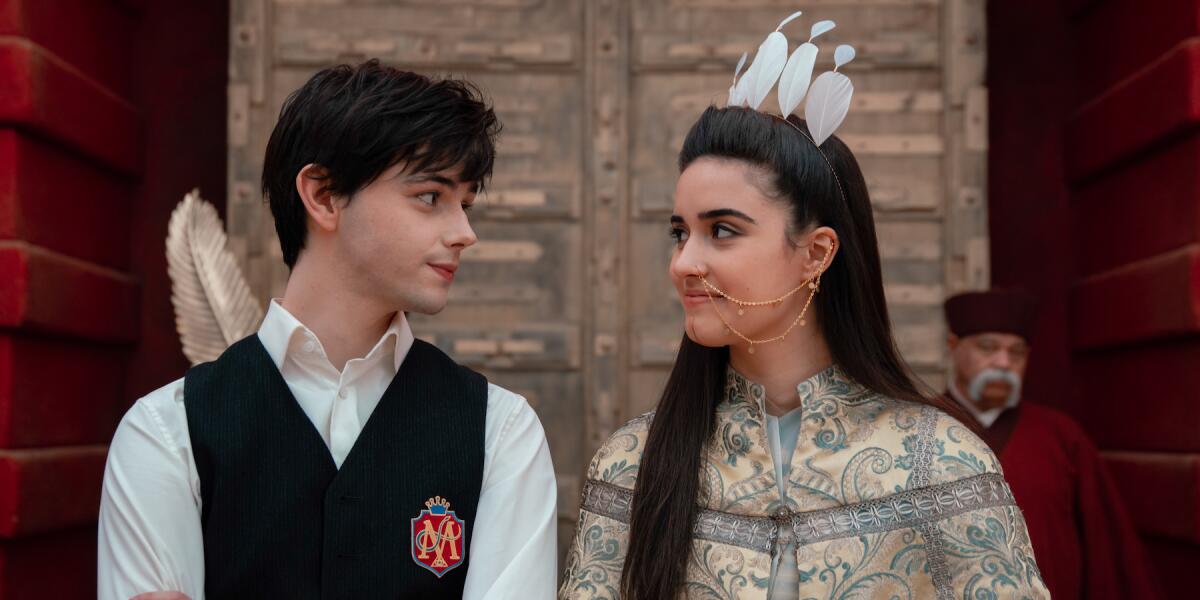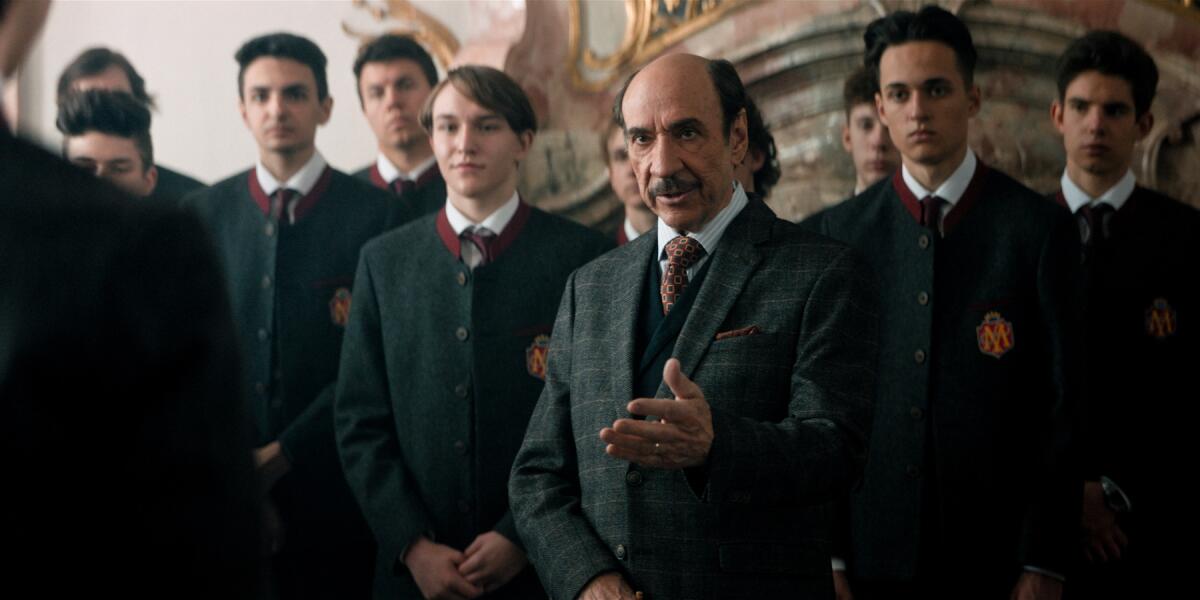Review: ‘The Magic Flute’ is enjoyable, even if it doesn’t always hit the high notes

- Share via
If viewers can focus on its engaging young cast, vivid appearances by several international opera stars and well-executed melding of reality and fantasy, “The Magic Flute,” the latest film adaptation of Mozart’s famed opera, should prove a buoyant and enjoyable musical journey. But purists, cynics and those who like a little edge with their contemporary retreads of classic material may beg to differ.
Unlike perhaps the best-known screen version of “Flute,” Ingmar Bergman’s 1975 filmed record of his staged opera (first shown on Swedish TV, then released theatrically), this new iteration adds even more magic to the proceedings. Directed by first-time film helmer Florian Sigl, from a script by Andrew Lowery, Jason Young and David White (Sigl and producer Christopher Zwickler receive “created by” credit), the movie presents Mozart’s work as a kind of story within a story — a portrait of two analogous worlds.
For your safety
The Times is committed to reviewing theatrical film releases during the COVID-19 pandemic. Because moviegoing carries risks during this time, we remind readers to follow health and safety guidelines as outlined by the CDC and local health officials.
This clever, duoverse approach first finds earnest 17-year-old Tim Walker (a charming and limber Jack Wolfe) entering the esteemed Mozart All Boys Music School, a sort of Hogwarts for gifted musicians tucked away in the Austrian Alps. He arrives late in the semester to hone his craft as a singer and follow in the footsteps of his recently deceased father (Greg Wise), an alumnus of the institute.
But life at the school is typically fraught for Tim, who encounters bullying, hazing, steep competition, an anxious roommate (Elliot Courtiour), an opera star’s troublemaking son (Amir Wilson) and the imperious headmaster, Dr. Longbow (Oscar-winner F. Murray Abraham, who tangled with Mozart in the 1984 film “Amadeus”). Longbow puts Tim through his paces, with a watchful eye and a critical tongue, all in the service of turning him into “a world-class singer.” Meantime, music history teacher Mr. Baumgartner (Tedros Teclebrhan) takes a more measured and supportive stance.
In addition, auditions for the school’s Christmas recital, a production of — you guessed it — “The Magic Flute,” are looming and Tim is eager to play the lead role of Prince Tamino, a favorite of his dad. But will Tim have what it takes to win the part?
Tim finds a way to escape the pressures — yet face all new ones — when he discovers a mystical portal in the school library that zaps him into another realm where the tale of “The Magic Flute” is unfolding in all its operatic, fantastical grandness. Tim gets his real-life wish to embody the handsome Prince Tamino and is soon on a collision course with a monstrous serpent, the evil Sarastro, Priest of the Sun (the Metropolitan Opera’s Morris Robinson), and the mysterious Queen of the Night (French soprano Sabine Devieilhe), whose beautiful daughter, Princess Pamina (Asha Banks), Tamino is tasked with saving from grave danger (not to mention destined to fall in love with). Not everything, however, is what it seems.

Tim will access the gateway to “Magic Flute”-land numerous times in order to pass all the tests of courage his Tamino faces. These include sustaining a crucial vow of silence plus life-and-death trials by fire and water. But, at least as presented here, they’re not as nail-biting to overcome as lore may have it.
Tamino is helped along the way by spirited sidekick — and the Queen’s birdcatcher — Papageno (Iwan Rheon of “Game of Thrones” and the British sitcom “Vicious”). He also gets some magical aid from the titular flute, which is bestowed upon him by the Queen’s three female servants (Larissa Herden, Jasmin Shakeri, Jeanne Goursaud).
Back in reality, Tim finds himself falling for Sophie (Niamh McCormack), a student on the distaff side of the Mozart academy with an inside track at the school. But aside from a lovely scene in which they collaborate on a sweet rendition of the Jackson 5 tune “I’ll Be There,” their moments together can feel low on chemistry.
As for Mozart’s iconic music, there’s plenty of gorgeous orchestration along with several standout vocal performances, particularly Devieilhe’s thrilling rendition of the Queen’s aria, “The Wrath of Hell,” and Robinson’s deep-throated “Before Our Holy Altar.” The late-breaking “Pa Pa Papagena” (with Stéfi Celma of the hit French TV series “Call My Agent!” as Papageno’s similarly named soulmate) is lots of fun. Though what’s offered is, by necessity, a significantly truncated version of Mozart’s original creation, the film suitably hits the highlights and serves as an accessible introduction to the beloved piece. (Jeremy Sams provided the English libretto.)
The movie, executive produced by filmmaker Roland Emmerich (“Independence Day,” “Moonfall”), was effectively shot on Bavarian soundstages and in Mozart’s hometown of Salzburg, Austria, including at the city’s Schloss Leopoldskron, a palace where parts of “The Sound of Music” were also filmed. But the prehistoric-like, Canary Island desert backdrops aren’t always the ideal match for much of the opera-fantasy action played against them.
Costumes and production design are strong, though the opera-world scenes tend toward a more theatrical look. Visual effects by Pixomondo (“Game of Thrones”), notably its animation of the Queen’s ill-fated megasnake, are also proficient.
Although there are some obvious parallels between both the music school and in-opera stories (did you know that love conquers all?), they don’t line up as elegantly as they might. And the movie’s final moment, despite its own sense of narrative logic, feels like a cheat and a perhaps less glorious way to take us out than the film deserves.
Still, this “Magic Flute” has much to recommend and is a worthy, well-performed, often stirring and dazzling take on an enduring masterwork.
'The Magic Flute'
Not rated
Running time: 2 hours, 4 minutes.
Playing: Starts March 10 in general release










